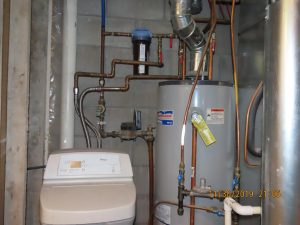Home Inspection Savage | Home Inspector 952-583-8608
 When hiring a home inspector, getting your water heater inspected should never be over looked.
The water heating system, being a combination of plumbing and fuel connections, deserves considerable attention from the homeowner and any prospective home buyer. An improperly installed or malfunctioning water heater can burst or even explode, causing water damage to a house or injury to the occupants. With gas and oil water heaters, defective equipment, improper installation, or inadequate maintenance can result in fire damage and carbon monoxide poisoning.
The life expectancy of a water heater is typically eight to twelve years and, here in our area, it will typically be fueled by gas or electric. Further north of us, oil is commonly used to heat water as well as indoor temperature.
Unfortunately, a water heater often functions right up to the minute of failure without sending out any warning signs of problems to come. Your plumbing contractor or, if you have placed a purchase contract on a home, your home inspector are trained to seek and recognize the telltale signs that indicate failure is just around the corner.
The home inspector will look for the following issues:
When hiring a home inspector, getting your water heater inspected should never be over looked.
The water heating system, being a combination of plumbing and fuel connections, deserves considerable attention from the homeowner and any prospective home buyer. An improperly installed or malfunctioning water heater can burst or even explode, causing water damage to a house or injury to the occupants. With gas and oil water heaters, defective equipment, improper installation, or inadequate maintenance can result in fire damage and carbon monoxide poisoning.
The life expectancy of a water heater is typically eight to twelve years and, here in our area, it will typically be fueled by gas or electric. Further north of us, oil is commonly used to heat water as well as indoor temperature.
Unfortunately, a water heater often functions right up to the minute of failure without sending out any warning signs of problems to come. Your plumbing contractor or, if you have placed a purchase contract on a home, your home inspector are trained to seek and recognize the telltale signs that indicate failure is just around the corner.
The home inspector will look for the following issues:
- Check for corrosion and rust on the tank, especially near seams and at joint connections with water pipes. If accessible, they will remove the cover plate from a gas heater tank. They will inspect the burner, the bottom of the tank, and surrounding areas and finding rust inside a tank indicates that it will soon need replacing.
- If the inspector finds soot inside the tank it would mean that the burner is malfunctioning and requires IMMEDIATE service. The presence of soot strongly indicates that carbon monoxide is probably not being vented properly.
- As always with plumbing equipment, they will check around for signs of leaks, but keep in mind that not all water around the heater indicates a leak. When incoming water is very cold, condensation may form on the outside of the tank. It can also form on the inside casing of the tank and cause sizzling noises when a gas or oil burner comes on. This condition is not hazardous and is no reason for alarm, usually. However, if the water droplets don’t disappear when the heater is operating or if the burner does not stop sizzling, then the tank is probably leaking and should be replaced.
- All water heaters are required to have a temperature pressure release valve installed to release any excessive pressure that is built up inside the tank. They will make sure they are not blocked, plugged or otherwise impede the function of this valve, for it is designed to release pressure to avoid explosion. They will look to indicate the valve should be pointed to the floor and have piping extending from it to approximately six inches from the floor to avoid scalding. If the valve is leaking, plugged or does not release when the handle is maneuvered, it should be replaced.
- They will check to see if the venting system, for a gas heater, must be fully intact and functioning to ensure that poisonous gases are released outside the home. By no means does this list include everything that is and should be checked on a water heating system but, hopefully, it will help you to know more about your system than you knew before and protect you from harm.
Home Inspection Savage | Home Inspector 952-583-8608